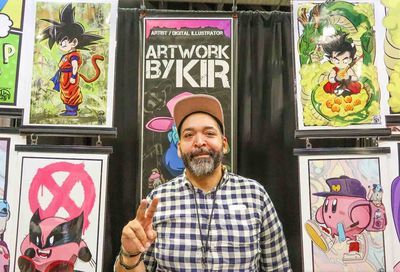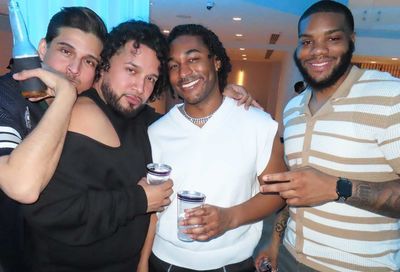Local News Briefs
GLBT issues in 2007 Virginia Legislative Session; Marylander activists support transgender rights; One in Ten receives arts grants from DCCAH
Virginia Legislative Session wraps
Sarah Gustafson, president of Equality Fairfax, says she is ”pleased” with the outcome of Virginia’s 2007 legislative session, which convened Jan. 10, and adjourned on Saturday, Feb. 24.
Gustafson and other activists are celebrating the defeat of House Bill 1727, which would have jeopardized the existence of gay-straight alliances by requiring that all public schools in the state implement either an opt-out or opt-in policy before students could participate in after-school programs. Activists argued that it would create obstacles for gay students who are seeking resources, and are not out to their parents yet.
 Gustafson (Photo by Todd Franson) |
There was also the passage of HB 2730, which allows adult hospital patients in the state to decide who is granted visitation rights, and works to benefit same-gender couples.
”I was pleased with the unanimous support that the hospital visitation rights bill had,” Gustafson says. ”Nobody tried to turn that into a ‘pro-gay bill.’ They looked at it for what it was, as helping out all families.”
The legislative session was also a reminder for her and other activists of the work that needs to be done in Virginia, she adds. Currently Virginia’s anti-discrimination policy includes gay people by an executive order first issued by former Gov. Mark Warner (D) and then extended by Gov. Tim Kaine (D). Measures that would have codified that protection by permanently placing ”sexual orientation” in local and state employee non-discrimination policies, were dismissed and defeated right away.
Gustafson is optimistic about the implications of the session.
”It’s better to see us going forward then going backwards,” Gustafson says of the advances made this year, ”which is a big improvement from last year.”
Marylander activists support transgender rights
About 20 people gathered in Columbia on Monday night for Equality Maryland’s town meeting regarding two bills that would prohibit discrimination against transgender people living in the state.
”This is the third transgender meet-up we’ve [held] since we started this campaign six months ago,” says Sara Ryan, field organizer for Equality Maryland. ”Twenty people doesn’t sound like a lot, but that’s 20 different people that we’ve had at three different events,” a sign of the group’s persistence to fight for equality, she says.
Monday’s meeting was organized to raise awareness about two bills, Senate Bill 516 and House Bill 945, which would prohibit discrimination in the areas of employment, housing, credit and public accommodations. Baltimore is currently the only jurisdiction in Maryland that offers protection for transgender people. Equality Maryland is advocating for legislation to protect transgender people across the state from discrimination in the workplace, which Ryan says often leads to unemployment, loss of housing and lack of healthcare.
Dana Beyer, a retired doctor who unsuccessfully ran to become Maryland’s first transgender delegate in the Legislature last year, and Lisa Mottet, a lawyer who directs the National Gay and Lesbian Task Force’s Transgender Civil Rights Project, spoke at the event.
”The goal was to empower transgender people and transgender allies to tell their stories so legislatures know the severity of hardship and discrimination that transgender [people] face,” Ryan says.
”Too many transgender people have been discriminated against, and too many transgender people have really suffered because of it… but they’re mobilized and excited about the bills, and they’re going to be a huge part of the process towards passage.”
One in Ten awarded DCCAH grants
The D.C. Council on Arts and Humanities granted One in Ten, the organization that has produced the Reel Affirmations film festival in Washington for the past 16 years, among other events, with $47,600 to fund film screenings throughout the year.
According to a Feb. 22 press release, the DCCAH presented One in Ten with two grants: $30,000 from the City Arts Project, created to advance access and encouragement for local artists and underserved communities; and a $17,600 Grant in Aid award to support operating costs for Reel Affirmations.
”For the DCCAH to award One in Ten with two grants reflects that our hard work and dedication to programming for D.C.’s GLBT community has paid off,” Elizabeth Braman, board president at One in Ten, said in the release. ”This grant will certainly allow us some breathing room in our crucial non-festival months as we plan our programming calendar”.
One in Ten Executive Director Margaret Murray expressed similar sentiments.
”This is a wonderful show of support for One in Ten’s programming, outreach to the community and a vital acknowledgment of the role we play in the cultural life of the city,” she said.
Support Metro Weekly’s Journalism
These are challenging times for news organizations. And yet it’s crucial we stay active and provide vital resources and information to both our local readers and the world. So won’t you please take a moment and consider supporting Metro Weekly with a membership? For as little as $5 a month, you can help ensure Metro Weekly magazine and MetroWeekly.com remain free, viable resources as we provide the best, most diverse, culturally-resonant LGBTQ coverage in both the D.C. region and around the world. Memberships come with exclusive perks and discounts, your own personal digital delivery of each week’s magazine (and an archive), access to our Member's Lounge when it launches this fall, and exclusive members-only items like Metro Weekly Membership Mugs and Tote Bags! Check out all our membership levels here and please join us today!
Local News Briefs
DC Police chief names Lt. Jova head of Gay and Lesbian Liaison Unit; Unid@s advocates for Latino/a GLBTs; Cuc Vu named HRC's chief diversity officer
Jova to be liaison to GLLU, Chief Lanier
Metropolitan Police Department Lt. Alberto Jova told the Gertrude Stein Democratic Club that he would be working closely with new Police Chief Cathy Lanier.
Literally — his desk is next door to her office.
Jova spoke at the club’s Feb. 12 meeting.
”Chief Lanier has provided me the distinct privilege of serving as her advisor regarding [the Gay & Lesbian Liaison Unit] and GLBT matters,” he said in a press release earlier in the day.
At the club’s meeting, Jova, who is gay, announced that he will serve as both Lanier’s liaison to the City Council as well as the head of the GLLU, and said he was ”eager and excited” about his role there.
Another officer will be assigned the day-to-day functions at the GLLU, he said. That person will report to Jova, who will report to the chief. Jova’s priorities include domestic violence in same-sex households, crystal-meth abuse and violence against the transgender community.
Jova dismissed rumors of plans to downsize the GLLU, and said he hopes to expand the department with two more officers.
”We’re not going to eliminate it,” he said. ”We’re going to amplify it.”
Jova, a native of Cuba, came to Washington with his family in 1971. He received his bachelor’s degree in English Literature from the University of Maryland, followed by a Master’s in Management from Johns Hopkins University. –Yusef Najafi and Will O’Bryan
Unid@s advocates for Latino/a GLBTs
The 13 people that make up the board of directors for Unid@s, a new national Latina/o lesbian, gay, bisexual and transgender rights organization based in Washington, will take on their leadership titles March 1. Among them is Ruby Corado, a 17-year resident of Washington, whose involvement with Unid@s dates back to 2004 when Latino rights advocates from around the country met in Seattle to form the group’s steering committee.
”It’s important to fill the Latino void because we don’t have a [major organization] talking about immigration and things that are unique to us,” she says, noting that the ”@” symbol in Unid@s is used to emphasize the group’s versatility and gender inclusiveness.
”It’s important to be able to provide a unique voice because there are so many Latinos in [the gay] community, and they deserve to have a voice,” she says.
Corado is well known among Washington’s gay community as president of the local group Latin@s en Acción. She’s also a member of Metropolitan Washington’s Transgender Coalition, and works full-time as a health educator at Whitman-Walker Clinic.
Unid@s will focus on basic human rights as well as issues pertaining to the Latina/o community, including economic disparities, social justice issues, violence, racism and immigration issues, Corado says.
”I know that we are going to get what we want,” she says, ”but it’s not going to happen overnight.”
Unid@s is currently planning its first meeting, scheduled for the third weekend of April. — Yusef Najafi
HRC hires first chief diversity officer
Cuc Vu, the former lesbian immigration campaign manager at the Service Employees International Union (SEIU), has accepted a position at the Human Rights Campaign as the organization’s first chief diversity officer, a senior-level position in which she will work closely with HRC President Joe Solmonese.
As chief diversity officer, Vu will conduct research and organize plans to generate greater response and appeal from diverse communities.
”She will play a key role in making sure we execute our vision of diversity within our ranks and membership with the same urgency we use to help companies create policies and work environments that are supportive and welcoming for gay, lesbian, bisexual and transgender Americans,” Solmonese said in a Feb. 6 press release.
A Seattle native, Vu moved to Washington in 1994, after acquiring a master’s degree in policy and public administration from Columbia University in New York, to work for the D.C. Department of Labor.
”I believe we can become one of the most successful organizations in the country by uniting the strength of our 650,000 members and supporters with people of all races and backgrounds,” she said in the release. ”It’s an incredibly exciting prospect with many challenges and rewards.” — Yusef Najafi
Support Metro Weekly’s Journalism
These are challenging times for news organizations. And yet it’s crucial we stay active and provide vital resources and information to both our local readers and the world. So won’t you please take a moment and consider supporting Metro Weekly with a membership? For as little as $5 a month, you can help ensure Metro Weekly magazine and MetroWeekly.com remain free, viable resources as we provide the best, most diverse, culturally-resonant LGBTQ coverage in both the D.C. region and around the world. Memberships come with exclusive perks and discounts, your own personal digital delivery of each week’s magazine (and an archive), access to our Member's Lounge when it launches this fall, and exclusive members-only items like Metro Weekly Membership Mugs and Tote Bags! Check out all our membership levels here and please join us today!
Local News Briefs
Councilman Graham's legislation to review safety of youth-oriented nightclubs. DC Rape Crisis Center creates GLBT-focused groups
New Law Proposed for Youth in Clubs
D.C. Councilmember Jim Graham (D-Ward 1) has proposed legislation that would require all establishments in Washington that serve alcohol after 11 p.m. and admit patrons under 21 to apply for a new liquor license. Establishments would be required to submit security plans for approval by the Alcoholic Beverage Regulation Administration (ABRA).
Plans would be reviewed for the number and location of security personnel; procedures for checking ID and patron searches; procedures to ensure that alcohol is only served to those over 21; procedures for handling violent incidents and emergencies; procedures for crowd control; maintaining a violent-incident log; and a statement on the training completed by security personnel.
”We’re going to schedule hearings,” Graham says, ”I don’t have a date yet, and we’re going to consult with a lot of people, but we are going to move forward with the bill.”
Graham announced that he would turn his attention to improving the safety of underage patrons in Washington’s nightspots as a result to the killing of Taleshia Ford, a 17-year-old who died after being accidentally shot during an altercation inside a straight club on U Street NW on Jan. 20.
”We could have another Club 1919 incident if we don’t move forward,” Graham says, ”there’s nothing preventing it.” —Yusef Najafi
Rape Crisis Center Launches GLBT Groups
The D.C. Rape Crisis Center (DCRCC) launched its first working group for members of the gay community last night.
The center has held support groups for members of the GLBT community in the past, but this is an effort that focuses on discussing and implementing solutions and long-term goals in the battle against sexual violence among the gay community.
”A similar working group, designed to focus on the transgender community, is scheduled to meet at 7 p.m., on Tuesday, Feb. 13 on the seventh floor of 1325 Massachusetts Ave., NW. Joseph Vess, community-organizing assistant at DCRCC says it is vital that members of the transgender community attend the solution group on Tuesday.”
”This is very much a community-based program, and we’re going to be depending on involvement by members of these communities to make this program a success,” he says.
Vess says the center will run the groups through funding from the D.C. Office of Victim Services. The group maintains a Web site at www.dcrcc.org.
Vess says at this time it’s unclear how often the meetings will be held because membership is ”fluid,” anybody can join at anytime. He added that it’s primarily up to the group members to decide. Solutions in addressing sexual violence against the GLBT community will be determined by group members, and could include a variety of options including educational campaigns.
”Right now we’re just getting it off the ground,” he says.
Support Metro Weekly’s Journalism
These are challenging times for news organizations. And yet it’s crucial we stay active and provide vital resources and information to both our local readers and the world. So won’t you please take a moment and consider supporting Metro Weekly with a membership? For as little as $5 a month, you can help ensure Metro Weekly magazine and MetroWeekly.com remain free, viable resources as we provide the best, most diverse, culturally-resonant LGBTQ coverage in both the D.C. region and around the world. Memberships come with exclusive perks and discounts, your own personal digital delivery of each week’s magazine (and an archive), access to our Member's Lounge when it launches this fall, and exclusive members-only items like Metro Weekly Membership Mugs and Tote Bags! Check out all our membership levels here and please join us today!



























